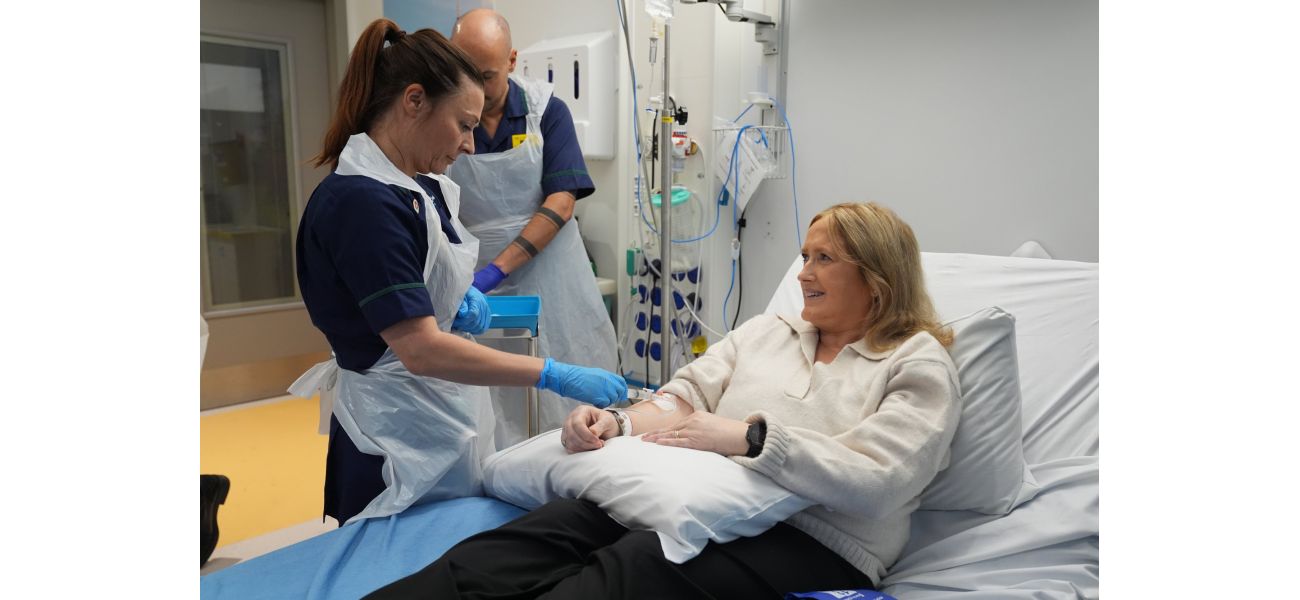NHS trial offers new treatment for Lupus, deemed groundbreaking.
A new cell therapy in Germany offers hope of long-term relief for those with the disease.
November 8th 2024.

Katie Tinkler, a 50-year-old patient in the UK, recently shared her experience with a new treatment that has the potential to be life-changing. Along with two other lupus patients, she received a groundbreaking treatment that could eliminate the need for lifelong medication. This treatment, called CAR T-cell therapy, was previously only used on cancer patients but is now being tested as a one-time treatment for the most severe form of lupus.
Lupus is a chronic autoimmune disease that can cause serious damage to the heart, lungs, brain, and kidneys. For Katie, this treatment could mean a chance at a life free from the struggles of lupus. She shared, "If this works, it's life-changing. Up till now, there's never been anything for lupus that is a possible cure. The dream is to be lupus-free - that would be phenomenal."
For those unfamiliar with lupus, it is a condition where the body's immune system attacks its own tissues instead of harmful bacteria. There are two main types - discoid lupus and systemic lupus erythematosus (SLE). In the UK, there are approximately 70,000 people living with lupus. Discoid lupus affects the skin, causing round lesions on sun-exposed areas, while SLE can affect various parts of the body such as joints, kidneys, and the brain.
The cause of lupus is still unknown, but research suggests a genetic predisposition may play a role. This new CAR T-cell therapy works by modifying the body's immune system to recognize and attack problem cells. This mode of treatment has already shown promising results in patients with other conditions, and now it is being tested for lupus.
One of the main symptoms of discoid lupus is scaly or crusty rashes on the skin, often triggered or worsened by sun exposure. These lesions can cause pain and sometimes lead to hair loss. SLE, on the other hand, presents with joint and muscle pain, extreme fatigue, and discoid rashes that are aggravated by sun exposure. The NHS also lists other less common symptoms such as headaches, mouth ulcers, a high temperature, hair loss, weight loss, and depression.
Currently, there is no confirmed cure for lupus, but symptoms can be managed with early treatment. Patients with discoid lupus may receive strong steroids, while those with SLE may be prescribed anti-inflammatory drugs and other medications depending on their specific symptoms. This new CAR T-cell therapy offers a different approach to treatment by restoring the body's ability to attack problem cells. In some cases, it has even led to remission, where patients no longer need lupus-related medication.
Professor Ben Parker, a consultant rheumatologist and lead of the Manchester Royal Infirmary study, said, "We are delighted to be the first to deliver this fantastic research in the UK, which we hope will revolutionize treatment for patients with high-risk lupus and potentially lead to a cure for the disease." He also added, "Lupus is a disease that requires lifelong medication, but this therapy has the potential to change that, which is incredibly exciting."
The trial for this new treatment took place at the University College London Hospitals NHS Foundation Trust, and it marks a significant milestone in lupus research. Ms. Tinkler, who underwent the therapy, shared her excitement, saying, "I'm beyond excited at the prospect of long-term relief." However, it is important to note that this treatment is still in its early stages and requires further testing to ensure its effectiveness and safety for patients.
People undergoing this treatment must stay in the hospital for ten days and may experience side effects such as a weakened immune system and the possibility of an overactive immune response. But for many patients like Katie, the potential benefits of this new treatment far outweigh the risks. As Dr. Eleni Tholouli, the director of the adult stem cell transplant unit at Manchester Royal Infirmary, said, "It is an incredibly exciting time to now offer this mode of treatment to lupus patients through this clinical trial, which we hope will provide positive outcomes and revolutionize treatment options for patients with the disease."
Lupus is a chronic autoimmune disease that can cause serious damage to the heart, lungs, brain, and kidneys. For Katie, this treatment could mean a chance at a life free from the struggles of lupus. She shared, "If this works, it's life-changing. Up till now, there's never been anything for lupus that is a possible cure. The dream is to be lupus-free - that would be phenomenal."
For those unfamiliar with lupus, it is a condition where the body's immune system attacks its own tissues instead of harmful bacteria. There are two main types - discoid lupus and systemic lupus erythematosus (SLE). In the UK, there are approximately 70,000 people living with lupus. Discoid lupus affects the skin, causing round lesions on sun-exposed areas, while SLE can affect various parts of the body such as joints, kidneys, and the brain.
The cause of lupus is still unknown, but research suggests a genetic predisposition may play a role. This new CAR T-cell therapy works by modifying the body's immune system to recognize and attack problem cells. This mode of treatment has already shown promising results in patients with other conditions, and now it is being tested for lupus.
One of the main symptoms of discoid lupus is scaly or crusty rashes on the skin, often triggered or worsened by sun exposure. These lesions can cause pain and sometimes lead to hair loss. SLE, on the other hand, presents with joint and muscle pain, extreme fatigue, and discoid rashes that are aggravated by sun exposure. The NHS also lists other less common symptoms such as headaches, mouth ulcers, a high temperature, hair loss, weight loss, and depression.
Currently, there is no confirmed cure for lupus, but symptoms can be managed with early treatment. Patients with discoid lupus may receive strong steroids, while those with SLE may be prescribed anti-inflammatory drugs and other medications depending on their specific symptoms. This new CAR T-cell therapy offers a different approach to treatment by restoring the body's ability to attack problem cells. In some cases, it has even led to remission, where patients no longer need lupus-related medication.
Professor Ben Parker, a consultant rheumatologist and lead of the Manchester Royal Infirmary study, said, "We are delighted to be the first to deliver this fantastic research in the UK, which we hope will revolutionize treatment for patients with high-risk lupus and potentially lead to a cure for the disease." He also added, "Lupus is a disease that requires lifelong medication, but this therapy has the potential to change that, which is incredibly exciting."
The trial for this new treatment took place at the University College London Hospitals NHS Foundation Trust, and it marks a significant milestone in lupus research. Ms. Tinkler, who underwent the therapy, shared her excitement, saying, "I'm beyond excited at the prospect of long-term relief." However, it is important to note that this treatment is still in its early stages and requires further testing to ensure its effectiveness and safety for patients.
People undergoing this treatment must stay in the hospital for ten days and may experience side effects such as a weakened immune system and the possibility of an overactive immune response. But for many patients like Katie, the potential benefits of this new treatment far outweigh the risks. As Dr. Eleni Tholouli, the director of the adult stem cell transplant unit at Manchester Royal Infirmary, said, "It is an incredibly exciting time to now offer this mode of treatment to lupus patients through this clinical trial, which we hope will provide positive outcomes and revolutionize treatment options for patients with the disease."
[This article has been trending online recently and has been generated with AI. Your feed is customized.]
[Generative AI is experimental.]
0
0
Submit Comment





